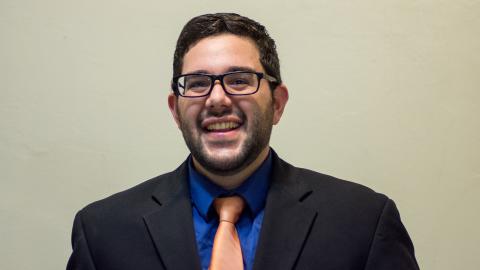The ECE Ph.D. candidate recently won the Best Paper Award at the IEEE BiCMOS and Compound Semiconductor Integrated Circuits and Technology Symposium for the novel testing approach.
Inside almost every piece of modern technology is a transistor controlling the electrical signals helping hardware to process information, amplify signals (like making a radio louder), or store data. Making transistors more powerful without sacrificing efficiency has been a constant struggle for developers.
Georgia Tech School of Electrical and Computer Engineering Ph.D. student Nelson Sepúlveda-Ramos was recently recognized for his transistor research that hopes to lead to smaller, faster, and more reliable devices.
He won the Best Paper Award at the IEEE BiCMOS and Compound Semiconductor Integrated Circuits and Technology Symposium (BCICTS) for his presentation titled, “Using Pulsed-Mode Measurements of SiGe HBTs for Non-Destructive, Improved RF-SOA Estimation.”
The paper explores innovative methodologies to study the physics of Silicon-Germanium heterojunction bipolar transistors (SiGe HBTs) and introduces new approaches for testing and defining enhanced safe operating limits to optimize performance.
SiGe HBTs are a special type of transistor made by combining two materials: silicon, which is used in most electronics, and germanium, which helps improve performance. These transistors work faster than regular transistors and perform well in extreme conditions, making them great for things like satellite technology.
Transistors operate within safe limits, ensuring they don’t overheat or break down during use. Traditional testing methods use continuous stress to determine these limits but must be applied cautiously to avoid damaging the transistor, meaning its full power potential isn’t fully utilized.
Sepúlveda-Ramos’ research proposed a "pulsed-mode measurements" approach which applies very short bursts of stress allowing for the limits of the transistor to be pushed closer to the actual limit.
The ability to push transistors further will allow engineers to more reliably study their behavior at higher levels and deliver better performance, like faster processing or stronger signals without risking damage.
This will allow engineers to develop more efficient designs for electronics, potentially leading to improved technology for society, including internet speed, GPS accuracy, and reliability of tech in cars, planes, and space exploration.
BCICTS is the IEEE’s premier annual technical conference, drawing leading researchers, industry experts, and students from around the globe to showcase pioneering advancements in semiconductor technology.
Sepúlveda-Ramos completed the research along with fellow ECE Ph.D. student Harrison P. Lee, senior research engineer Jeffrey W. Teng, who is now with the Aerospace Corporation, and Professor John D. Cressler, as part of Cressler’s Silicon-Germanium Devices and Circuits research team.
